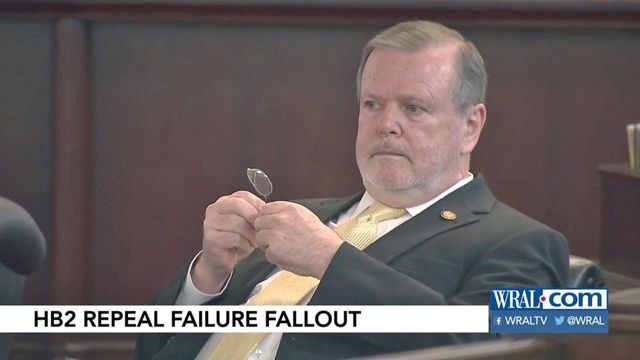Who killed the HB2 repeal?
Shortly after the state Senate finished a day filled with rancor and mistrust by rejecting efforts to repeal House Bill 2, the controversial measure dealing with transgender rights, shouts of "shame, shame, shame" rained down from the gallery.
Lawmakers picked up that refrain in post-session interviews, lumping shame on any and all they thought had scuttled the effort to remove North Carolina from an unfavorable national spotlight.
Democrats pinned the blame on Republicans who did not offer a "clean" repeal bill, but rather one with a moratorium on local nondiscrimination ordinances that LGBT advocates found objectionable. Republicans pointed their fingers at the 16 Senate Democrats who ended up voting against a bill they viewed as a political trap, the Charlotte City Council and, most especially, Gov.-elect Roy Cooper.
"Roy Cooper called every one of you and said don't vote for that," Senate President Pro Tem Phil Berger vented on the floor after watching the repeal effort fail.
Berger, R-Rockingham, personally sponsored the bill, and it is rare for the state's most powerful legislative leader to watch a measure he backed fail so completely once brought to the floor.
Cooper, for his part, larded criticism on House and Senate Republicans, who he said welshed on a deal to repeal the controversial measure. A "cooling off period" attached to the bill would have effectively left many of the restrictions House Bill 2 places on city and county governments intact through most of 2017.
"It is deeply disappointing to see the breach of trust we had today," Cooper said during a news conference at the PNC Arena.
The argument over who is to blame for the wheels coming off Wednesday's effort will likely rage into the new year, with all sides accusing the others of angling for partisan advantage and refusing to compromise. Cooper, a Democrat, and legislative Republicans already have had a contentious start to their relationship, with lawmakers stripping him of power before he takes office.
Now, rather than coming together over a House Bill 2 rollback, they find themselves sniping at one another over its wreckage.
Nine months of bad blood came rushing in
As Charlotte's City Council contemplated an ordinance in the early weeks of this year to extend protections to the LGBT community, Republican Gov. Pat McCrory and state lawmakers warned there would be consequences if it passed. In particular, GOP policymakers declared rules that required businesses and nonprofits allow transgender individuals to use the bathroom of their choice were a bridge too far.
Charlotte passed the ordinance, and lawmakers called themselves back to session and passed the measure that would be tagged "House Bill 2," more formally known as the Public Facilities Privacy & Security Act. The bill prevents cities and counties from putting such ordinances in place but goes further, delving into multiple areas of discrimination and employment law.
Reaction throughout the year was swift, sustained and fierce. Other states passed bans on travel for public employees to North Carolina, conferences pulled out of the state and sporting events such as the NBA All-Star Game and NCAA Tournament pulled out. In the face of that reaction, multiple efforts to repeal the bill were mounted, but none took hold. Republicans accused Charlotte officials and Cooper of undermining potential deals, while Democrats said GOP offers always came with strings attached.
Wednesday looked like a promising last chance to roll back the measure and start 2017 out from under the cloud that has dogged the General Assembly and political campaigns all year. But even that got off to a rocky start.
On Monday, Charlotte moved to repeal its ordinance as word quickly spread that a repeal deal could be at hand. Shortly after the council's action, Cooper announced he had helped broker a repeal deal that would lead to House Bill 2 being completely scrapped. That appeared to irk Republicans, particularly McCrory, who said Cooper was wrong to claim credit.
"This sudden reversal with little notice after the gubernatorial election sadly proves this entire issue originated by the political left was all about politics and winning the governor’s race at the expense of Charlotte and our entire state," McCrory said.
Despite that petulant start, lawmakers appeared to line up votes needed to roll back the controversial law. That was the case up through late Tuesday afternoon, when questions about what Charlotte actually did arose.
'Worst political stunt I've ever seen'
Once the special session was called, groups representing social conservatives such as the North Carolina Family Policy Council, the Christian Action League and the North Carolina Values Coalition began to pour on pressure, pushing lawmakers to reject the rollback deal.
"We continue to encourage our leaders to never sacrifice the privacy, safety or freedom of young girls by forcing them to use the bathroom, shower or change clothes with grown men just to satisfy the demands of greedy businesses, immoral sports organizations or angry mobs," Tami Fitzgerald, executive director of the Values Coalition, said in a statement after the repeal effort failed.
Arguments by proponents of keeping House Bill 2 on the books began to take hold as House Republicans gathered for a closed-door caucus session on Tuesday night at 6 p.m.
That's when news began circulating that the Charlotte City Council had not rolled back its entire ordinance. In particular, two sections unrelated to the bathroom provision had stayed on the books, and the council had attached a Dec. 31 deadline for lawmakers to repeal House Bill 2 or the ordinance would stay in place, albeit superseded by state law.
GOP House members argued over the repeal efforts for hours Tuesday evening, until around midnight. Those privy to the conversations described them as "brutal," "nasty" and, at some particularly tense moments, "close to violence."
When they arrived for Wednesday morning's session, many appeared in no mood to compromise, despite capitulation from the council. By the time the legislature gaveled in, council members had removed the Dec. 31 deadline and rolled back the remaining portions of their ordinance.
"The only extraordinary thing that has happened is the extraordinary hubris of a city council," said Rep. Jeff Collins, R-Nash, objecting that the General Assembly's fifth special session of the year had even been called. "I will be a 'no' on everything that comes forward."
Throughout the day, Republicans in the House and Senate continued tense, closed-door conversations, talking over the repeal bill and how they could structure the effort to win support of their more skeptical colleagues. But throughout the day, repeal opponents leaned heavily on the line that Charlotte's City Council had broken faith and that an unfettered deal was no longer possible.
"When you talk about trust, the City of Charlotte has been as disingenuous as anyone I've ever seen," Sen. Harry Brown, R-Onslow, said.
Sen. Andrew Brock, R-Davie, said he did not believe pleas from Charlotte that there was merely a misunderstanding.
"There's no way this was a technicality," Brock said. "This was the worst political stunt I've ever seen."
Republicans said it was Charlotte's failure to fully repeal its ordinance that started the cascade of failure.
"Charlotte acted Monday morning in absolutely the best faith possible with all the understanding and all the chips on the table about what Charlotte needed to do," said John Autry, a Charlotte City Council member who will serve as a state representative in the next General Assembly. "This morning, it came up that there was something else that should have been done. Charlotte took the initiative and showed leadership to the people of North Carolina that they were willing to do what they needed to do to resolve the issue of HB2."
It was lawmakers, Autry said, that were the problem.
Asked what he would say to liberal critics who said the city got played by Republican lawmakers, Autry said there have been no protections for LGBT individuals since House Bill 2 had passed anyway. Wednesday's legislative session, he said, was a shot at rolling back a bill many saw as problematic.
"Charlotte did everything it could," he said.
'We are not stupid'
By mid-afternoon, House Republicans said that any hope of passing a repeal was quickly dimming. But House Speaker Tim Moore and Berger kept meeting throughout the day, apparently pitching a series of offers and counter-offers designed to wrangle the necessary votes.
What they eventually came up with was a repeal bill that would roll back House Bill 2 but immediately place a moratorium on cities' and counties' ability to pass certain kinds of nondiscrimination protections. The final version of the offer would extend that moratorium until 30 days after lawmakers adjourned in 2017, likely taking the cooling off period well into August, September or October.
"A lot of the conversation we've had in here today demonstrates the need for a cooling off period," Berger said Wednesday night.
Without some sort of limitation, he said, LGBT advocates and others would be able to go out and push Charlotte-like ordinances in other cities and counties throughout the state. That would land North Carolina in exactly the same fix it's in now when lawmakers inevitably responded, he said.
But what Republicans viewed as a safeguard, Democrats said undercut the entire repeal effort.
"It's smoke and mirrors. It's a mirage. It's not real," Sen. Angela Bryant, D-Nash, told her colleagues. "I don't know if you think we're stupid, or the public is stupid," she continued, provoking applause from the Senate gallery that cut off her debate and drew a rebuke from Lt. Gov. Dan Forest.
Senate Democrats said that the repeal deal was essentially an indefinite extension of many of the things most objectionable about House Bill 2. Sen. Dan Blue, D-Wake, said that, with Republicans still in the majority next year, they could easily extend that moratorium through next year or the year after, essentially prolonging many of the features of House Bill 2 at will.
"It would never go away," Blue insisted.
That sentiment was echoed by Rep. Chris Sgro, D-Guilford, who is also the director of Equality North Carolina, an LGBT advocacy organization.
"We don't have time for the political antics Sen. Berger tried to pull," Sgro said.
As the evening wore on, it became apparent that Berger, too, was having trouble with his own membership. In a last-ditch effort to win both Democratic and Republican support for the repeal bill, he broke it into two parts. One was a pure repeal measure; the other would tack on the moratorium.
Sen. Ralph Hise, R-Mitchell, spoke out against the tactic.
"It allows the Senate to pass a bill that the majority of the Senate does not want to pass," Hise said.
With many House members looking on, senators voted to split the question but then voted down the repeal portion of the bill, with all 16 Democrats voting "no" along with 16 hard-line Republicans. Without Democratic help, there was no way to pass the measure.
"There is a huge problem of trust between the parties in this building," Berger said after the votes.
'Looked them in the eye'
Roughly 90 minutes after the Senate vote failed, Cooper stepped up to a podium at the PNC Arena.
"This was our best chance. It cannot be our last chance," Cooper said.
Negotiations over the fix started 10 days ago and continued last week even as lawmakers curtailed the incoming governor's power to appoint members of his administration.
"What they've been saying all along is they wanted Charlotte to repeal its ordinance first," Cooper said. "That's what they've said, that's what they've said in public, that is what they said to me. I looked them in the eye. That is what they said."
Cooper said he promised to deliver Charlotte's ordinance repeal and Democratic votes, and Republican lawmakers pledged to deliver enough votes to pass the repeal. Business leaders, LGBT advocates, Charlotte officials and lawmakers of all political stripes were on board, he claimed.
"The deal continued to be that it would be full repeal of House bill 2, and this moratorium thing doesn't fully repeal House Bill 2," he said.
A few liberal advocacy organizations backed up Cooper's version of events Wednesday night.
"Senator Berger and Speaker Moore failed to make good on the 'deal' they brokered with Gov.-elect Cooper to fully repeal HB2," said Chad Griffin, president of the Human Rights Campaign, a national LGBT organization that has argued for the law's repeal. "Their shameful actions and broken promises subject LGBTQ North Carolinians to state-mandated discrimination."
Throughout the year, Republicans accused Cooper and his fellow Democrats of scuttling repeal efforts and did so again Wednesday night.
"This was at least the third time that pressure from the left sabotaged bipartisan good faith agreements for political purposes," McCrory said.
Democrats, that thinking goes, want the issues surrounding HB2 to run on during special legislative elections tentatively planned for 2017.
On the Senate floor, Berger brandished a sheaf of papers he said showed Charlotte failed to fully repeal its ordinance. It was proof, he said, that neither Charlotte's City Council nor Cooper could be trusted.
"I am sorry folks," Berger said. "I don't trust them, and our folks don't trust them. They've given us no reason to trust them."
While Cooper has denied intervening over previous deals, he had no problem saying that he talked to House and Senate Democrats throughout the day Wednesday.
"I told the Democrats to vote for the deal to fully repeal House Bill 2," he said.
Sen. Mike Woodard, D-Durham, said that he didn't hear one-on-one from Cooper, but was on a conference call with him and other Senate Democrats.
"Our conversation led to a consensus," Woodard said, adding that lawmakers and the governor-elect alike viewed the moratorium language as both a political trap and something that wouldn't have the desired impact of luring business and sporting events back to the state.
Berger and Moore, Cooper insisted, failed to live up to their end of the bargain.
"When it came time for Republican legislative leaders to do their job, they failed," he said.
As he wound up a post-session news conference, Berger was asked if he and Cooper really had a deal.
"I made a commitment to bring it up," he said as he walked away off the Senate floor. He then paused and added, "And I think I honored that commitment."










